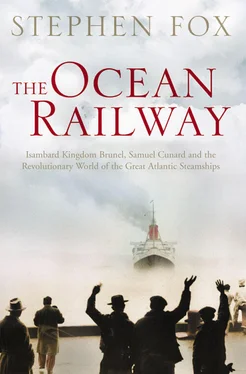Charles Dickens, impressed by what he had heard, took the Britannia to Boston in January 1842. His description of the voyage, soon published in his travel book American Notes, became the most famous – indeed notorious – account of a nineteenth-century transatlantic steamship trip. Dickens, about to turn thirty, had already achieved great success with the Pickwick Papers, Oliver Twist, and other novels. He went to tour America as a literary celebrity and was expecting an ocean passage that conformed with his status. At the Cunard agent’s office in London he had seen imaginatively embellished lithographs of the Britannia’s interiors. When he boarded ship, the actual accommodations caused his first disappointment. The main saloon, the grandest room on the ship, turned out to be ‘a long narrow apartment, not unlike a gigantic hearse with windows in the sides; having at the upper end a melancholy stove, at which three or four chilly stewards were warming their hands’. The overhead racks for glassware ‘hinted dismally at rolling seas and heavy weather’. Grimmer surprises awaited Dickens below. The ‘state-room’ specially reserved for Dickens and his wife was, alas, an ‘utterly impracticable, thoroughly hopeless, and profoundly preposterous box’. It inspired another funereal reference: the bunk beds by their narrow dimensions and thin mattresses reminded Dickens of coffins, a most unfortunate association at the start of a long ocean voyage.
Once under way, he retreated during daylight hours to the ladies’ cabin, less noisy and smelly than the main saloon. The stewardess dispensed many tactful services and told ‘piously fraudulent’ stories of previous winter passages, always calm and pleasant. Everybody worried about the stability of their stomachs; at dinner, Dickens noticed the most coveted seats were those closest to the door. Afterwards he stayed out on deck till midnight, afraid to go below. Despite his frettings, he looked around and sensed the powerful mysteries of an oceangoing ship at night: ‘The gloom through which the great black mass holds its direct and certain course; the rushing water, plainly heard, but dimly seen; the broad, white, glistening track that follows in the vessel’s wake; the men on the look-out forward, who would be scarcely visible against the dark sky, but for their blotting out some score of glistening stars…the melancholy sighing of the wind through block, and rope, and chain.’
Finally, too cold to avoid it any longer, Dickens took to his dubious berth. With hatches and portholes closed down for the night, he could fully savour ‘that extraordinary compound of strange smells, which is to be found nowhere but on board ship, and which is such a subtle perfume that it seems to enter at every pore of the skin, and whisper of the hold’. All the woodwork creaked. The stateroom rose and fell with the waves. The night eventually passed. For the next two days, through fair winds and good weather, Dickens mostly stayed in bed, ate hard biscuits, and drank cold brandy and water in a resolute, hopeless effort to avoid sliding over from mere seagoing discomfort into full-blown seasickness.
Teetering on this agonizing edge – nauseous or not? – Dickens fell over hard when the third morning brought a winter gale worthy of the North Atlantic. He awoke to his wife’s screams. Objects were floating on the seawater that now covered the stateroom floor. The room pitched and tossed, seemingly standing on its head. ‘Before it is possible to make any arrangement at all compatible with this novel state of things, the ship rights. Before one can say “Thank Heaven!” she wrongs again.’ The ship ran on like a creature with broken knees, as it leaped and dived and somersaulted in jarring sequences and combinations. Dickens hailed a passing steward and asked what was the matter. ‘Rather a heavy sea on, sir,’ came the reply, understated and unperturbed, ‘and a head wind.’ It continued for four days and nights of relentless motion and noise: wind, sea and rain, howling in concert; the heavy footfalls of sailors rushing about and shouting hoarsely to each other; high waves pounding over the gunwales and gurgling out through the scuppers, after landing on the wooden deck with the deep, ponderous sound of thunder heard within a confined space; blank, endless nights as the ship rolled to one side, dipping her masts, and then to the other side, and even seemed to stop dead in the water, staggering as though stunned, before ploughing onward. ‘All is grand, and all appalling and horrible in the last degree… Only a dream can call it up again in all its fury, rage, and passion.’
The storm blew out, but the weather remained dark and cold. Settling into a determined daily routine, Dickens and his party would gather in the ladies’ cabin shortly before noon. Captain Hewitt, recently transferred to the Britannia and always in good humour, would drop by and predict better weather. (‘The weather is always going to improve tomorrow, at sea.’) At one o’clock a bell rang and the stewardess brought baked potatoes, roasted apples, and plates of cold ham, pig’s face, and salted beef. At last free of seasickness, and seeking any possible diversion, they ate with hearty appetites and dawdled over the task as long as they could. They read, dozed, and chatted away the afternoon, passing around and chewing over the few available wisps of shipboard gossip: one passenger has lost heavily at gambling, fourteen pounds in fact, and drinks a bottle of champagne a day though he is only a clerk; the head engineer has never seen such awful weather; the cook was found drunk and severely punished; all the stewards have fallen downstairs, and some are sorely injured; the cabins are all leaking. The dinner bell rang at five, announcing more potatoes (boiled this time), various meats (perhaps roast pig if one of the ship’s swine had been butchered), flowing wine and brandy, and rather mouldy apples, grapes and oranges for dessert. Then a game of whist, with the tricks placed securely in pockets instead of on the ever-agitated table, and an insistently cheerful good night from the captain.
Approaching Halifax on the fifteenth night, with a bright moon and calm sea, the local pilot – who was supposed to know the harbour so well – managed to run the Britannia aground on a mud bank. Everybody rushed up on deck. The engine, ‘which had been clanking and blasting in our ears incessantly for so many days,’ stopped suddenly, unexpectedly, leaving a dead stillness. Some of the sailors took off their shoes and jackets and made ready to jump overboard and swim ashore. (This did not inspire confidence among the passengers.) Distress rockets were fired into the night sky, to no point. In the general confusion and near-panic, Captain Hewitt remained calm and in command. The next high tide floated them free. After briefly stopping in Halifax, the Britannia took Dickens on to Boston. Wary of enduring another steamship voyage, when his American tour was over he caught a New York sailing packet home to England.
It was a gripping story, slightly exaggerated to improve the telling. The fame of its author and the popularity of American Notes ensured the Dickens account a wide, enduring audience – and a cautionary influence on uncounted potential Atlantic travellers. As a piece of historical evidence, though, it remains tendentious and limited, not trustworthy as a generalization about Cunard ships. Dickens described a westward passage in January: the more difficult direction for crossing the Atlantic, at the coldest, wildest time of year. The Britannia then steamed through an especially ferocious winter storm, the roughest on the North Atlantic in a long time. Its attendant miseries properly belonged to the indifferent ocean and could not be blamed on the particular ship and crew. The Britannia ran aground near Halifax because of mistakes by the local pilot, not the Cunard Line. Many of the problems on the voyage were not the steamship line’s fault. And, in general, Dickens had nothing to compare the voyage to because he had never been at sea before. As a transatlantic innocent, he had too readily believed – or so he implied – those alluring promotional lithographs at the Cunard agent’s office. His unrealistic expectations collided hard with the actual experience; he felt betrayed and vengeful, perhaps even embarrassed by his initial naïveté, and then took his overstated public revenge in print. (The book sold well but drew generally displeased, unconvinced reviews. ‘ Sneers, vituperations, caustic sarcasms…a spirit of entire bad taste,’ said the Illustrated London News. This reviewer doubted in particular Dickens’s account of his trials on the Britannia: ‘Of course this is the mere nonsense of book-making exaggeration, written to kill time and tickle the reader.’)
Читать дальше












